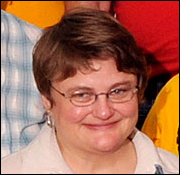Starr King names professor of UU history
The Rev. Dr. Susan Ritchie brings 'fresh eye' to understanding UU roots.
An expert in Unitarian Universalist history and identity, the Rev. Dr. Susan Ritchie, minister of the North Unitarian Universalist Congregation in Lewis Center, Ohio, has a special interest in the historical relationship between Unitarians and both Jews and Muslims. As the new associate professor of Unitarian Universalist History and Ministry at Starr King School for the Ministry in Berkeley, Calif., where she’s served as a visiting professor for the past several years, Ritchie will continue to explore the longstanding UU tradition of religious tolerance and its importance in UU identity.
Early Unitarians in Eastern Europe “had a fundamental conviction that you have to be in close relationship and dialogue with your neighbors,” particularly Jews and Muslims, said Ritchie, a third-generation UU who holds a Ph.D. in cultural/religious studies from Ohio State University and a master’s in divinity from the Methodist Theological School in Ohio. The basic tenet of religious tolerance of the UUA grew out of the thoughtful bonds that the nascent Unitarian community in Transylvania and Poland fostered with other religions, she said, adding, “That has a lot to say about how we try to figure out how to be multi-religious in this new world.”
The new professorship at Starr King is the result of a gift from a longtime UU, and is key to the school’s mission to educate UU ministers and others in progressive religious leadership, says the Rev. Dr. Rebecca Ann Parker, Starr King president. “This new, historically grounded sense of our UU identity is extremely important at the dawn of the 21st century, as people of progressive faith seek to witness and work for peace among the world’s religions,” she said. “For UUs in general, this appointment assures the ongoing, creative development of our UU understanding of our roots—one of the sources on which we draw for our religious lives today.”
And Ritchie is the ideal person for the professorship, she believes. “Dr. Ritchie brings a fresh eye to UU history, attending not only to multi-religious interchange as key to our history but doing so from a post-colonial, cultural studies lens that sheds new light on how we understand ourselves in global, multicultural, post-colonial contexts,” Parker added.
Ritchie, who lives in Columbus, Ohio, with her partner Donna, has written on a wide variety of topics in UU history and identity and postmodern religious cultural studies, and her work has been translated into Turkish and Hungarian. Her book, Children of the Same God: The History of Unitarianism in Relationship to Islam and Judaism, based on her 2009 Minns Lectures, will soon be released by Skinner House Books. She is working now on a book on polity. She has taught at Ohio State University, the University of Pittsburgh, and Eden Theological Seminary, earning awards for outstanding teaching.
In addition to teaching on-site at Starr King, Ritchie also teaches two off-site immersion courses on UU history. One focuses on North American UU history that she teaches at the UUA in Boston, where she combines coursework with visiting places around the city relevant to the class. And, at General Assembly each year, she teaches a course on polity, where a mix of UU and non-UU theological students observes the proceedings live, then discusses them. Ritchie also serves the association by sitting on the UUA Board of Trustees.
Her scholarship is extraordinary, according to Amy Shuman, a professor at Ohio State who was Ritchie’s dissertation adviser. Among the many students she’s mentored, “none is more brilliant than Susan,” Shuman said. “She’s really phenomenal, smart, thoughtful, kind, and very funny.” As a teacher and minister, Shuman says, Ritchie is “putting her gifts where they matter.”
Her intellectual pursuits inform her pastoral work at the UU congregation in Lewis Center, says Allison Fagan, a member of the congregation who has known Ritchie for 15 years. “Susan is an extraordinarily intelligent and insightful intellect,” said Fagan. “That’s paired with her being very down to earth and relationship-oriented and focused on the importance of small community.” Ritchie will continue to serve the congregation, commuting from her parish in Ohio to California for a week each month to teach at Starr King.
Parker agrees that Ritchie’s personal qualities are a benefit to her students and to her congregation. “Dr. Ritchie has a wonderful sense of humor; she’s keenly aware of the ironies and amusing paradoxes that often characterize our life together as progressive people of faith,” Parker said. “She is able to open people’s eyes to inconsistencies and even tragedies in our history, with a spirit of compassion for human failures as well as celebration of human courage, enabling people to see our history whole—not to valorize or vilify figures from our past, but to be in genuine relationship with them.”
Ritchie said that one of her favorite ways of understanding Unitarian Universalism is “as a Christian tradition that was never willing to accept Christian exclusivism.” In Transylvania in the 16th century, birthplace of Unitarianism, there was a commitment to living in harmony with their neighbors. “It didn’t want to think it was worshipping a different god than Jews and Muslims,” said Ritchie, “so they were reaching out to Jews and Muslims to understand exactly where they were same and different and wanting to define liberal Christian religion in a way that did not make them outside the family of Abraham.”
Ritchie said she’s excited about the professorship and continuing her teaching at Starr King and in other settings. “My hope is to continue to expand people’s very, very deep need for resources on UU identity,” she said, “and to make it absolutely unquestionable who we are and why knowing who we are is helpful in contemporary dilemmas.”
An abridged version of this article appeared in the Winter 2012 issue of UU World ("Starr King names UU history prof," page 48). See sidebar for links to related resources.
Comments powered by Disqus







